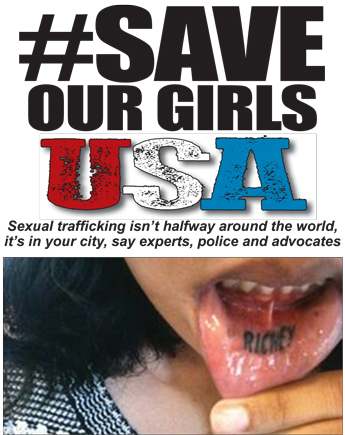
By Charlene Muhammad CHARLENEM
Editor’s note: This is part one of a three-part series on sexual slavery and Black America. It follows a special edition last year that explored the subject. Sex trafficking plagues young Black girls and a growing legion of advocates is working to help rescue children who’ve been pimped out and to prevent others from being snatched off buses and streets. They are trying to raise awareness about this tragedy disproportionately affecting Black girls. This report gives an overview of the problem and accounts from advocates and law enforcement.
LOS ANGELES (FinalCall.com) – Pimping, or sex trafficking, is a multi-billion dollar industry: Some say $64 billion worldwide and approximately $10 billion inside America. But at this moment, somewhere in your community, perhaps near your home, a predator is likely working to make $150,000 to $300,000 a year by selling the bodies of Black teenage girls.
The average pimp has four to six girls, according to statistics from the U.S. Justice Department and National Center for Missing and Exploited Children.
While many 13- to 14-year-old girls are being groomed for academic decathlons, recruited for middle and high school sports or drama clubs, others that age are being groomed for sex work.
Girls are raped, beaten, branded, indoctrinated, and sold day in and day out in a lucrative sex trade.
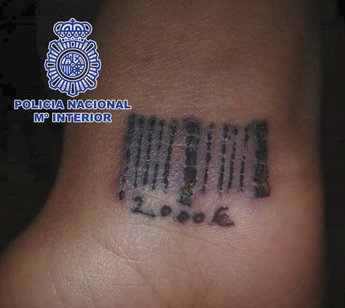
Survivors and advocates want the horror clearly identified as sex trafficking and not prostitution, especially when it comes to minors. “Child prostitution and Johns are two words that should not exist when addressing child sex trafficking because a child cannot commit to commercial sex according to state and federal law,” said Lt. Andre Dawson, officer-in-charge of the Los Angeles Police Department’s Human Trafficking Division, which is responsible for getting pimps off the streets.
Lt. Dawson said society needs a major shift: Children involved aren’t criminals, they’re victims. The buyers aren’t Johns, or sex purchasers, they’re rapists, he said.
Law enforcement advocates like Mary Howard, an officer and president of the Nu Alpha Delta Multicultural Sorority, a non-profit organization, agreed.
The sorority, comprised of women from various professional, organizational and faith backgrounds, has joined a growing movement of those outraged and ready to fight sex trafficking.
The sorority hosted a day-long “2014 Human Trafficking Intervention Forum” at Good Shepherd Missionary Baptist Church of Los Angeles. A second forum was held at Citizen Missionary Baptist Church in Compton.
The problem is real, Ms. Howard said. “We in the community need to embrace this (fight) and not wait until one of our youth or loved ones is a statistic,” she said.
Johns and Pimps 101
Sharee Sanders Gordon, deputy city attorney and Neighborhood School safety attorney in Los Angeles, said talking with parents and teachers is the best way to deal with how girls are stalked by would-be pimps.
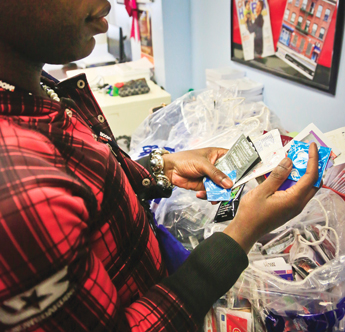
When she first started as neighborhood prosecutor for the 77th Division in South Los Angeles, prostitution along the Figueroa Street corridor was one of the first issues the community brought to her.
She had never thought about how devastating the problem could be for a child and a community.
“I never thought about how students going to school would have to divert themselves so they could go to a safer route, or being propositioned by young ladies on the street who were just confused, or seeing used condoms as they went to school,” Atty. Sanders Gordon said.
As she grew more entrenched in the community and her work, and seeing nothing really being resolved in the courts, she helped to develop a Prostitution Diversion Program targeting repeat offenders. The program aids victims and strives to help improve their lives, she said.
Part of the problem is a lack of resources to deal with pimps, as well as jail overcrowding, the prosecutor explained. Penalties for pimping amount to 30 days but sometimes pimps get out the same day they’re arrested, she said.
Her program works with service providers that help women who are victims of trafficking and street prostitution exit the life. Her program provides food, clothing, shelter, medical care, individual and group counseling, and job training.
The Prostitution Diversion Program also works to increase education and awareness through John Schools, rehabilitation programs for men from all walks of life who purchase sex. Since 2008 over 1,000 people have gone through the program and only four have reoffended, she noted.
Critics sometimes bash the work with Johns because they’re part of the problem, but the point is to stop the same individuals from helping to destroy the community, Atty. Sanders Gordon explained. Basically, educators spend a day scaring John School attendees, she said. They give facts about sexually transmitted diseases and the impact of arrests, but perhaps the most compelling thing that helps Johns stop is personal testimony from sex trafficked girls.
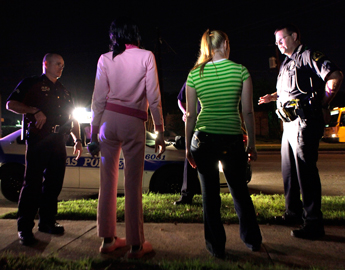
One middle school on Western Avenue is having a serious problem with prostitution activity, said Atty. Sanders Gordon. “Young ladies are being grabbed off bus stops and forced into prostitution … and it’s happening in our own back yard. This is not something that’s happening somewhere else. It’s happening right in our own back yard,” she stressed.
Five people in Moreno Valley, Calif., were arrested on suspicions of abducting a teenager from Compton allegedly for prostitution, she noted. The 18-year-old victim was able to escape, but not before allegedly being raped by two of the suspects. The four men and a female suspect were from the San Francisco Bay Area, according to Atty. Sanders Gordon.
“Now you ask why did they come down here? Because Los Angeles is now being known for the place to come when you want to get an underage prostitute from the bus stop. Grab her. And they look for young ladies who no one’s watching,” she said. “They look for girls who are at bus stops late at night or who are alone and they’re taking them by gunpoint,” she said.
Root causes and symptoms of active sex trafficking
Tony Muhammad, Nation of Islam Western Region Student Minister, encouraged advocates and police to go to the root of the pimping problem. The problem is spiritual and mental, he said during his address at the Nu Alpha Delta Multicultural Sorority sponsored forum.
“Don’t just deal with the effects of what’s going on in the poor communities because you’re looking at the fruit that’s coming from a rotten tree,” he said.
“Where did trafficking start? Pimping didn’t start with the gangs that’s doing it. Pimping started with the slave ship. You can’t just deal with branches,” Mr. Muhammad said.
He was not defending pimps wreaking havoc on the Black community, but reminding listeners that a man engaged in such is not in his natural state.
“How did God want this thing to be? How did the man get out of control? In the Nation of Islam, we believe that no man can rise any higher than his woman, who is the second self of God … We have to line this thing up,” Mr. Muhammad said.
“Something’s missing and in my honest opinion, I haven’t seen a group that is as good at reforming Black men in particular like the Nation of Islam,” he said. “Malcolm was a pimp, but you love him now. But he was a pimp! Who changed him and what changed him … all Elijah Muhammad did was line Malcolm’s mind back up with God’s mind.”
The task is to teach Black men acting as pimps and self-haters how they got in their condition and how they lost their names, language, religion and culture, he said. “Get those things back and you will begin to tune yourself up.”
Tattoos or branding?
Many frown at the sight of big, bright or deep, dark tattoos on youth, especially on young females. While some of the tattoos are by choice, others are by force.
According to Atty. Sanders Gordon, a pimp in San Diego County brands, or tattoos, his girls inside their mouths, as if they were property. Such pimps call themselves “entrepreneurs” poised to make $300,000 per girl, per year tax free, she said.
Pimps love to memorialize their conquests, observed Lt. Dawson. But in tattoo branding their victims, they’re now providing material that can be used as court evidence, he added.
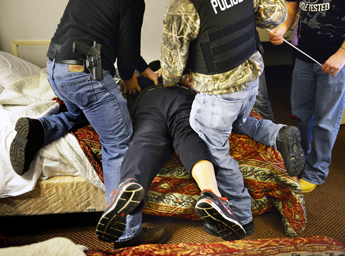
Lt. Dawson gave a slide presentation that shocked attendees into silence and prompted verbal outbursts. One photo depicted girls with the acronym C.R.EA.M. (Cash Rules Everything Around Me) tattooed across their cheeks, breasts, thighs and rear of their legs, extending from their buttocks.
The message from the pimp who branded them is no matter what you say about me, my name is on your face, Lt. Dawson said. Dollar signs are very popular too, he added.
The branding is all part of the pimps’ indoctrination process, he continued.
The presentation contained images typically unseen in documentaries on sex trafficking because it’s a tough story to tell. “In this stage of the game, I’m trying to show the reality of it and the crisis that these people are in. It’s sad. It’s sad how people are treating each other and what’s more disgusting is what grown men are doing to these children,” Lt. Dawson told The Final Call.
Another slide showed a seated pimp, posing for the camera. Behind him was a young, nude girl face down on a counter in a planking position. Her hands were shackled behind her back. Her head was covered with a white plastic garbage bag.
According to Lt. Dawson, some pimps have a structured entity with a seal and nationwide licensing. A pimp who was recently convicted had his “pimping license” revoked and lost all right to refer to himself as a pimp by the organization, Lt. Dawson continued. The banned pimp was told he’d be fined $500,000 per violation if he went against the ban, according to the police lieutenant.
It sounds ridiculous, but it’s true, he said.
“You do the math. They’re making money. The girls are reusable every day. They’re just a product to these guys and it’s easier to sell a young lady than it is with drugs, because with drugs, once it’s gone, you have to go out and buy new drugs. But when you have a young lady out there, you can use her over and over and over again,” said Atty. Sanders Gordon.
Many listeners sat fuming in their seats with angry faces, shaking their heads or wiping away tears. The audience was clearly moved as Atty. Sanders Gordon continued to share the horrors experienced by young victims.
The case that broke her heart involved a then 17-year-old from Orange County, Calif., who decided she would become a prostitute on her own, make some extra money and then leave the streets.
Two pimps eyed her and gave her an ultimatum.
“‘You’re working for one of us, so you just pick which one you want to work for,’ ” the pimps told her, according to the prosecutor.
The teen, frantic to get away, started walking down the middle of the street in morning rush hour traffic, she recalled. The girl eventually was rescued by police.
The District Attorney rejected the case, fearing she wouldn’t testify and all Atty. Sanders Gordon could do was file a misdemeanor charge.
After a grueling court trial endured by the girl, her mother, father, and younger brother, the pimp was convicted.
“It was just devastating for her but she wanted to make sure that that individual never did that to anyone else,” Atty. Sanders Gordon said.
“We as a community need to take charge of the situation because the court systems are not able to do it on their own. We’re only going to be able to have any kind of lasting effect if we work on this together,” Atty. Sanders Gordon declared.












